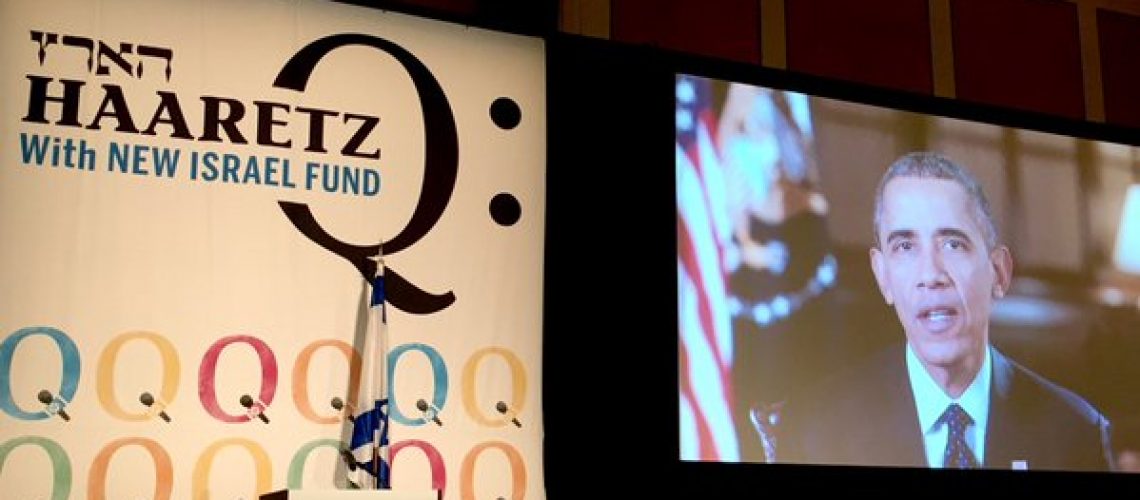As explained at its outset, the “Q” in the “HaaretzQ” conference stands for questioning, and all of the panel discussions were framed in the form of a question being addressed by the speakers. HaaretzQ was the joint creation of the left/liberal Israeli newspaper, Haaretz, and of the human-rights funding nonprofit organization, the New Israel Fund. Over a thousand people attended, with hundreds reportedly on the waiting list, at a midtown Manhattan hotel, Sunday, Dec. 12th.

It’s the latest in a long tradition of ambitious values-oriented political conferences that liberal and left-wing American Jews have conducted and participated in since the 1970s, including New Jewish Agenda, Tikkun, the Shalom Center, the Workmen’s Circle, the New Israel Fund, and in more recent years, J Street.
Like most of these conferences, HaaretzQ provided an embarrassment of riches in a dizzying array of sessions on offer, including most in simultaneous “breakout sessions” that presented participants with the dilemma of having to choose among intriguing alternatives. Haaretz has helpfully posted a summary of sessions online. And the New Israel Fund has posted videos of the highest profile speeches plus photos like the one above (click here).
It began with a video greeting from Pres. Obama and speeches from three prominent voices across a spectrum of opinions and interests: Pres. Reuven Rivlin, PLO secretary-general Saeb Erekat and Zionist Union co-leader Tzipi Livni. Rivlin and Livni both have family roots in the right-wing Revisionist movement and spoke from the heart, with Rivlin acknowledging that the audience did not agree with him on some issues. Livni spoke of her concern some years ago that her change to a more dovish and liberal perspective would hurt the feelings of her elderly mother. Yet both speakers commented somewhat critically on the presence of the Israeli NGO, Breaking the Silence, at the conference, and both defended soldiers of the IDF as fundamentally moral in outlook and deed.
This NY Times article, “Israeli Veterans’ Criticism of West Bank Occupation Incites Furor,” explains the controversy and why Rivlin and Livni are both defensive on this matter:
Breaking the Silence highlights what it views as the corrosive nature of the occupation of the West Bank on Israeli society by publishing the testimonies of soldiers, mostly anonymously. Abuses like looting and the destruction of Palestinian property, it argues, have become the norm. . . .
“Breaking the Silence is perceived as unfairly attacking the I.D.F. and its conduct,” said Yohanan Plesner, the president of the Israel Democracy Institute, a nonpartisan research group in Jerusalem. “So they are putting themselves on a collision course with the most valued and respected institution in Israel and with the psyche of Israelis who feel they are in a struggle for survival.”
And at a time Israelis fear for their safety amid a wave of stabbings, shootings and attacks with vehicles by Palestinians, and in the absence of condemnation from the Palestinian leadership, Mr. Plesner added, “There is not much patience for the message that the I.D.F. is in the wrong.”
But Rivlin’s very appearance at the conference has drawn right-wing criticism, as the New Israel Fund has for years been subject to vilification for providing grants to such human rights NGOs as Breaking the Silence; and Haaretz is likewise viewed with suspicion (to put it mildly).
I was puzzled and amused when the Israeli flag was carried off the stage as if it were part of a patriotic demonstration following Rivlin’s speech. I later discovered that it was in deference to Erekat’s demand to not appear in the presence of an Israeli flag. This struck me as similar to MK Ayman Odeh’s insistence on speaking to the Conference of Presidents at a location visibly apart from the Jewish Agency; both demands were surely as troubling to most Zionists as this kind of symbolism is problematic to Palestinians. It’s sad that relations have so soured with the PLO that one of its leaders would insist on such an action.
Erekat elicited unanimous sympathy and some shock when he revealed that his nephew was killed the week before at a West Bank checkpoint. During a later panel, another PLO participant shut down moderator Aluf Benn (the Haaretz editor-in-chief) when he had tried to interject the circumstances of his death, with the IDF claiming that he was killed while attacking soldiers.
I was most interested in the closing plenary, however, with speeches by the American Ambassador to the UN Samantha Power, and the head of the Joint Arab List in the Knesset Ayman Odeh, followed by an engrossing conversation between journalists Peter Beinart and Ari Shavit. Click here for Part 2. . .

